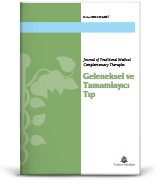Amaç: Bitkisel ürünler ile tedavi (fitoterapi), günümüzde gerek hekimler ve sağlık çalışanları gerekse hastalar tarafından giderek artan düzeyde kullanılmaktadır. Bu çalışmada, hekimlerin fitoterapiye ilişkin genel tutum ve görüşlerinin incelenmesi amaçlanmıştır. Gereç ve Yöntemler: 1 Mart-10 Mayıs 2021 tarihleri arasında, Dokuz Eylül Üniversitesi Tıp Fakültesi dâhilî birimlerinde görev yapan 150 hekim çalışmaya dâhil edildi. Katılımcılara, 1. bölümde demografik verilerini, 2. bölümde fitoterapi hakkında genel bilgilerini ve tutumlarını, 3. bölümde ise fitoterapinin uygulanabilirliği ve tedavide kullanımı hakkında görüşlerini değerlendirmeyi amaçlayan toplam 28 sorudan oluşan anket uygulandı. Bulgular: Yüz elli katılımcının 73'ü asistan, kalan 77 kişi uzman, doçent ve profesör olarak değişmekte olup; %42,7'si erkek, %57,3'ü kadındı. Yaş ortalaması 33,13±7,63 yıl idi. Katılımcıların sadece %8,7'si fitoterapi ile ilgilendiğini ifade etti. Hekimlerin karşı olma veya ilgilenmeme sebeplerinin başlıcaları, fitoterapinin kanıtlanmış bir tedavi olmadığını düşünmeleri (%60), hastaların önerilen tedaviyi bilinçsiz kullanacağı endişesi (%52), yasal düzenlemenin yetersiz olması (%46), sadece plasebo etkisi olabileceği (%20) ve zararlı yan etkilerinin olabileceği (%12,7) düşüncesidir. Sonuç: Mesleki tecrübe ile fitoterapi uygulamaya eğilim arasında fark yoktu. Öğretim elemanları ile asistan hekimlerin fitoterapi sertifikasyon programına katılma oranları arasında anlamlı fark yok iken, fitoterapi yüksek lisans eğitimi alma oranları arasında istatistiksel olarak anlamlı fark saptandı. Tüm katılımcılar fitoterapi ürünlerinin yasal düzenleme ile takip edilmesi gerektiğini savunmuştur.
Anahtar Kelimeler: Fitoterapi; hekim; görüş; anket
Objective: Treatment with herbal products (phytotherapy) is increasingly used by both physicians and healthcare professionals, as well as patients. In this study, it was aimed to examine the general attitudes and opinions of physicians towards phytotherapy. Material and Methods: Hundred fifty physicians working in the Internal Units of Dokuz Eylül University Faculty of Medicine between March 1-May 10, 2021 were included in the study. Participants first part, demographic data; the 2nd part includes general knowledge and attitudes about phytotherapy; in the third part, a questionnaire consisting of 28 questions was applied to evaluate the opinions about the applicability of phytotherapy and its use in treatment. Results: Of the 150 participants, 73 assistants the other 77 are specialists, associate professors and professors, 42.7% of them are male and 57.3% are female. The mean age was 33.13±7.63 years. Only 8.7% of the participants stated that they were interested in phytotherapy. The reasons for the irrelevance are the lack of evidence-based studies (60%), the unconscious use of the recommended treatment (52%), the insufficient legal regulations (46%), only the placebo effect (20%), the thought that there may be harmful side effects (12.7%). Conclusion: There was no difference between professional experience and tendency to apply phytotherapy. While there was no significant difference between residents and other specialists in participating in the phytotherapy certificate program, there was a statistically significant difference between them in terms of participating in the phytotherapy master's degree. All participants stated that phytotherapy products should be followed by legal regulation.
Keywords: Phytotherapy; medical doctor; attitude; survey
- Dhama K, Karthik K, Khandia R, Munjal A, Tiwari R, Rana R, et al. Medicinal and therapeutic potential of herbs and plant metabolites/extracts countering viral pathogens-current knowledge and future prospects. Curr Drug Metab. 2018;19(3):236-63. [Crossref] [PubMed]
- Barnes J, Anderson LA, David J, Barnes P, Phillipson A, Phillipson D. Herbal Medicines. 3rd ed. London: Pharmaceutical Press; 2007.
- Eisenberg DM, Davis RB, Ettner SL, Appel S, Wilkey S, Van Rompay M, et al. Trends in alternative medicine use in the United States, 1990-1997: results of a follow-up national survey. JAMA. 1998;280(18):1569-75. [Crossref] [PubMed]
- Giannelli M, Cuttini M, Da Frè M, Buiatti E. General practitioners' knowledge and practice of complementary/alternative medicine and its relationship with life-styles: a population-based survey in Italy. BMC Fam Pract. 2007;8:30. [PubMed] [PMC]
- Renda G, Kaya Yaşar Y. Primary care physicians and community pharmacists approach to the use of herbal products: a pilot study in Trabzon. Türkiye Aile Hekimliği Dergisi. 2018;22(3):141-56. [Crossref]
- Gamsızkan Z, Kurt AE, Yücel A, Kartal M. Physicians' opinions of phytotherapy products. Journal of Clinical and Analytical Medicine. 2011;2(2):1-3. [Crossref]
- Cohen MM, Penman S, Pirotta M, Da Costa C. The integration of complementary therapies in Australian general practice: results of a national survey. J Altern Complement Med. 2005;11(6):995-1004. [Crossref] [PubMed]
- Premik M. Alternative medicine in Slovenia: some social-medical views. Health Care Anal. 1998;6(1):59-64. [Crossref] [PubMed]
- Ang-Lee MK, Moss J, Yuan CS. Herbal medicines and perioperative care. JAMA. 2001;286(2):208-16. [Crossref] [PubMed]
- Saw JT, Bahari MB, Ang HH, Lim YH. Potential drug-herb interaction with antiplatelet/anticoagulant drugs. Complement Ther Clin Pract. 2006;12(4):236-41. [Crossref] [PubMed]
- Kurhekar JV. Ancient and modern practices in phytomedicine. In: Egbuna C, Mishra AP, Goyal MR, eds. Preparation of Phytopharmaceuticals for the Management of Disorders. 1st ed. London: Elsevier; 2021. p.55-75. [Crossref]







.: Process List